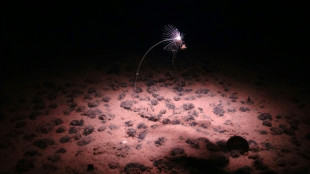
-
 Vance puts Europe, China on notice over AI regulation
Vance puts Europe, China on notice over AI regulation
-
Rubiales says 'totally sure' Hermoso consented to kiss

-
 'Ridiculous and lame': South Africans mock Trump proposals
'Ridiculous and lame': South Africans mock Trump proposals
-
Galeries Lafayette owner Ginette Moulin dies aged 98

-
 Macuga leads US team combined charge, Vonn struggles
Macuga leads US team combined charge, Vonn struggles
-
Warren Gatland to leave job as Wales coach: reports

-
 JD Vance puts Europe, China on notice at AI summit
JD Vance puts Europe, China on notice at AI summit
-
Singapore seniors hoof it to horse therapy

-
 Global stocks mixed as tariff uncertainty looms
Global stocks mixed as tariff uncertainty looms
-
Fiorentina blast racist abuse of Italy striker Moise Kean

-
 Kremlin: 'Significant part of Ukraine wants to be Russia'
Kremlin: 'Significant part of Ukraine wants to be Russia'
-
Liverpool ready for 'battle' against Everton in final Goodison derby: Slot

-
 Europe rights court condemns Russia for suppressing Ukraine war dissent
Europe rights court condemns Russia for suppressing Ukraine war dissent
-
Australia look to fine tune for Champions Trophy in Sri Lanka ODIs

-
 BP pledges strategic 'reset' as profit tumbles
BP pledges strategic 'reset' as profit tumbles
-
Gucci owner Kering's annual profit plunges

-
 Trump signs orders for steel, aluminum tariffs to start March 12
Trump signs orders for steel, aluminum tariffs to start March 12
-
Seoul says N. Korea has given Russia 200 long-range artillery pieces

-
 EU leaders vow 'firm' response to US tariffs
EU leaders vow 'firm' response to US tariffs
-
New Zealand rethinks opposition to deep-sea mining

-
 Asian markets mixed as tariff uncertainty looms large
Asian markets mixed as tariff uncertainty looms large
-
South Korea's Yoon blames 'malicious' opposition for martial law bid

-
 Russia's 'shadow fleet' brings 'high risk' of oil spill
Russia's 'shadow fleet' brings 'high risk' of oil spill
-
Doncic off the mark as Lakers rout Jazz

-
 Trump signs executive orders for steel, aluminum tariffs to start March 12
Trump signs executive orders for steel, aluminum tariffs to start March 12
-
Trump floats Ukraine 'may be Russian someday' ahead of Zelensky-Vance meeting

-
 Pacific nation Vanuatu elects prime minister
Pacific nation Vanuatu elects prime minister
-
'My own Apocalypse Now': 'White Lotus' returns with steamy Thailand romp

-
 Malaysia's Hindus mark Thaipusam festival with fervour
Malaysia's Hindus mark Thaipusam festival with fervour
-
Philippine divorce activists vow to fight on

-
 Virus disinformation drives anti-China sentiment, lockdown fears
Virus disinformation drives anti-China sentiment, lockdown fears
-
World leaders seek elusive AI common ground at Paris summit

-
 Asian markets swing as tariff uncertainty looms large
Asian markets swing as tariff uncertainty looms large
-
Venezuela sends planes to fetch irregular migrants from US

-
 Google changes name of Gulf of Mexico to 'Gulf of America' for US users
Google changes name of Gulf of Mexico to 'Gulf of America' for US users
-
YouTube, the online video powerhouse, turns 20

-
 Playgrounds come alive again with Brazil school phone ban
Playgrounds come alive again with Brazil school phone ban
-
'So fast': NY subway shove survivor captures commuter fears

-
 Could a climate megaproject cloud Chile's unparalleled views of universe?
Could a climate megaproject cloud Chile's unparalleled views of universe?
-
Trump's tariff tactics may reshape global trade: analysts

-
 Trump warns 'all hell' will break loose if Gaza hostages not returned
Trump warns 'all hell' will break loose if Gaza hostages not returned
-
Trump warns of 'all hell' if Gaza captives not freed by Saturday

-
 Trump signs executive orders on steel, aluminum tariffs
Trump signs executive orders on steel, aluminum tariffs
-
Elon Musk heads group trying to buy control of OpenAI: report

-
 Young, Irving replace Giannis, Davis in NBA All-Star line-ups
Young, Irving replace Giannis, Davis in NBA All-Star line-ups
-
US judges challenge Trump cuts as legal battles mount

-
 Celtic's Maeda cleared to face Bayern Munich
Celtic's Maeda cleared to face Bayern Munich
-
Global stock markets brush off latest Trump tariffs

-
 Union sues over US consumer protection agency work pause
Union sues over US consumer protection agency work pause
-
Inter a point behind leaders Napoli after squeezing past Fiorentina


Russia's 'shadow fleet' brings 'high risk' of oil spill
As ageing and deficient tankers in the "Russian shadow fleet" traffic the shallow waters of the Baltic Sea, a major oil spill disaster looms, experts told AFP.
Security analysts say Russia is operating a large "shadow fleet" of hundreds of vessels, seeking to dodge the sanctions Western nations imposed on its oil exports over its full-scale invasion of Ukraine in 2022.
Often rusty and obsolete, they operate in the Baltic Sea without Western protection and indemnity (P&I) insurance and with crews lacking experience navigating in winter conditions.
That is triggering alarm in the shallow, tricky-to-navigate Baltic Sea, whose only access to the Atlantic Ocean is via a narrow strait between Sweden and Denmark.
"The risk for an oil spill accident has existed for many years in the Baltic Sea, but the Russian shadow fleet has increased the risk significantly," said Mikko Hirvi, head of maritime safety at the Finnish Border Guard, charged with responding to environmental threats in the Baltic Sea.
For over two years the Finnish Border Guard has been keeping a close eye on the "shadow fleet" in the Gulf of Finland -- the heavily trafficked easternmost bay of the Baltic Sea -- bordered by Estonia in the south and Russia to the east.
Latvia, Lithuania, Poland, Germany, Sweden and Denmark also border the sea.
The Finnish authority defines the "shadow fleet" as old and technically deficient tankers that had not been sighted on the Baltic Sea before Russia invaded Ukraine in 2022.
The number of these vessels has since soared.
"We estimate 70 to 80 loaded oil tankers depart from Russian ports every week transporting oil through the Gulf of Finland. Of these, some 30 to 40 vessels belong to the shadow fleet," Hirvi said.
Around 430 vessels have been identified as constituting the shadow fleet globally, according to a report by the Kyiv School of Economics.
"A huge chunk of them sails through the Danish straits, because Russia relies heavily on their Baltic ports for export, especially of crude oil," said Yevgeniy Golovchenko, a political scientist at the University of Copenhagen.
Western officials have also accused the vessels of sabotaging undersea communications and power cables in several high-profile incidents.
- Accident waiting to happen -
Hirvi said the tankers were increasingly hiding their location data by jamming GPS and disabling AIS, a global tracking system vessels use to provide identification and positioning information to other ships and border stations, with the aim of preventing collisions.
"They turn off the system to black out their visits to Russia and circumvent the sanctions", he said.
"The risk for an accident is high."
Ownership of the vessels is opaque. They often sail under the flags of states such as Gabon, Liberia and the Cook Islands.
Some carry more than 100,000 tonnes of oil -- meaning a collision, or running aground, could result in a massive spill, with fatal consequences for the marine environment and its fragile ecosystems, the Swedish Coast Guard told AFP.
"These are big oil tankers which carry a lot of fuel, meaning the oil will always reach land... and it might reach many countries' coasts," said Mattias Lindholm from the Swedish Coast Guard.
In the event of an accident off Denmark, "the most likely scenario is that Danish taxpayers will have to pay" for clean-up since the ships lack proper insurance, Golovchenko said.
- Seeking solutions -
To curb the security and environmental risks, Denmark's maritime authority said this month it would strengthen checks of oil tankers in its waters, while the Finnish Border Guard has been increasing cooperation between authorities.
As international waters, the Danish straits are subject to the right of free passage, and any measures that would effectively stop the tankers from crossing the Baltic Sea require balancing international law with political will, Golovchenko said.
Kristina Siig, professor of maritime law at the University of South Denmark, told AFP it would be "technically doable" to stop the "entrance and exit to the Baltic Sea just by blocking what is basically three kilometres (less than two miles) of a bridge", but illegal under international law.
The European Union has blacklisted 79 of the vessels. Further measures targeting the shadow fleet are due to be included in its next round of sanctions.
W.Lapointe--BTB
